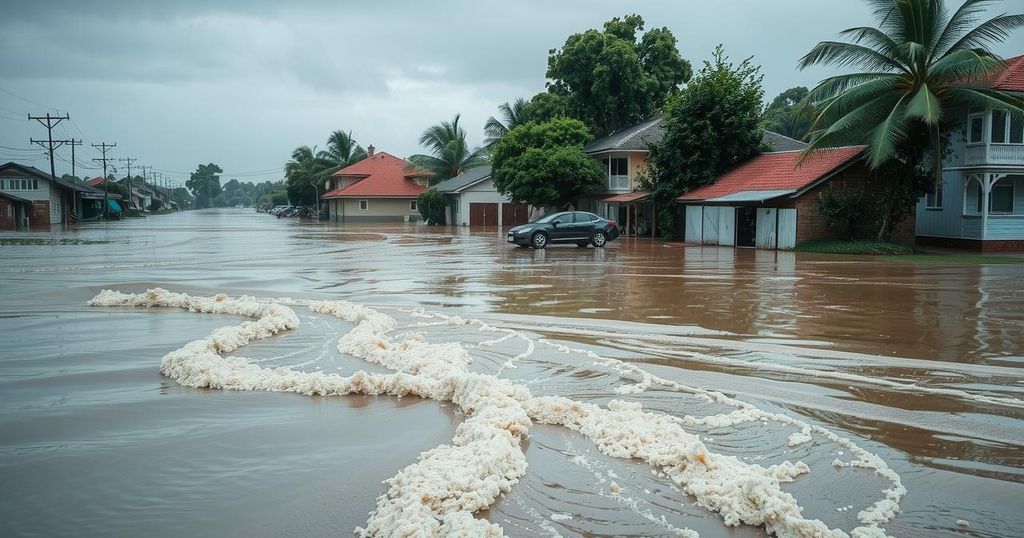World news
AFRICA, ATLANTIC OCEAN, CABO DELGADO, CHI, CHIURE, EMERGENCY RELIEF, EMERGENCY RESPONSE, INDIAN OCEAN, ISA, ISADORA ZONI, ISLAMIC STATE, MECUFI, MOZAMBIQUE, NATIONAL INSTITUTE FOR NATURAL DISASTERS, NATURAL DISASTER, NATURAL DISASTERS, UNITED NATIONS, UNITED NATIONS ’ REFUGEE AGENCY, UNITED NATIONS OFFICE FOR THE COORDINATION OF HUMANITARIAN AFFAIRS, ZONI
Fatima Alavi
0 Comments
Cyclone Chido Causes Devastation in Mozambique, Death Toll Rises to 75
Cyclone Chido has escalated the death toll in Mozambique to 75, affecting the Cabo Delgado province already suffering from an insurgency. The cyclone has led to significant casualties and extensive damage, with hundreds of thousands displaced. Rescues are ongoing, revealing shocking destruction across the region, amplifying existing humanitarian crises.
Cyclone Chido has wreaked havoc in Mozambique, with the death toll currently reported at 75, a significant increase from earlier estimates. The cyclone struck Cabo Delgado province, a region beset by an insurgent conflict that has already displaced hundreds of thousands. Rescue operations have uncovered devastating destruction, leaving behind a landscape of flattened buildings and uprooted lives. The storm claimed the lives of at least 69 individuals and injured approximately 740. The situation is dire, with numerous areas remaining inaccessible following the storm’s impact.
Most buildings in the district of Mecufi were reportedly destroyed, a situation described as “utter destruction” by Isadora Zoni of the United Nations’ refugee agency. The cyclone’s impact extends beyond immediate casualties, as it further complicates the lives of those already suffering from conflict-induced displacements. Hundreds of people are currently living in tents, exacerbating their vulnerability to climate-related disasters. The cyclone’s powerful winds, recorded at 115 miles per hour, have illustrated the increasing climatic threats faced by Mozambique, known for its susceptibility to natural disasters.
The cyclone also struck Mayotte, a French archipelago, resulting in a reported death toll of at least 31. Historical patterns suggest that Cyclone Chido may herald the start of an intense rainy season, prompting concerns about future cyclones and flooding. Past cyclones have already caused significant fatalities, with Tropical Cyclone Freddy and Cyclone Gombe leaving disastrous outputs in recent years. As Mozambique faces the dual crises of conflict and climate change, urgent humanitarian efforts are required to support the impacted populations.
Cyclone Chido’s impact in Mozambique highlights the intersection of natural disasters and human conflict. Cabo Delgado, where the cyclone made landfall, has been plagued by a prolonged insurgency that has displaced numerous residents. Mozambique is one of the countries severely affected by climate change, regularly experiencing powerful storms and floods, particularly during the southern Indian Ocean cyclone season. Historical data indicates an alarming trend of increasing frequency and intensity of cyclones impacting the region, further straining an already vulnerable population that is grappling with persistent economic and social challenges.
In conclusion, Cyclone Chido represents a catastrophic event for Mozambique, exacerbating the distressing circumstances of a population already burdened by conflict and displacement. With a rising death toll and widespread destruction, immediate and comprehensive humanitarian assistance is essential. The incident also underscores the urgency of addressing climate resilience in Mozambique, a country subject to frequent climatic catastrophes. Moving forward, it is vital for national and international communities to prioritize aid and develop strategies to mitigate the impacts of future cyclones.
Original Source: www.nytimes.com




Post Comment